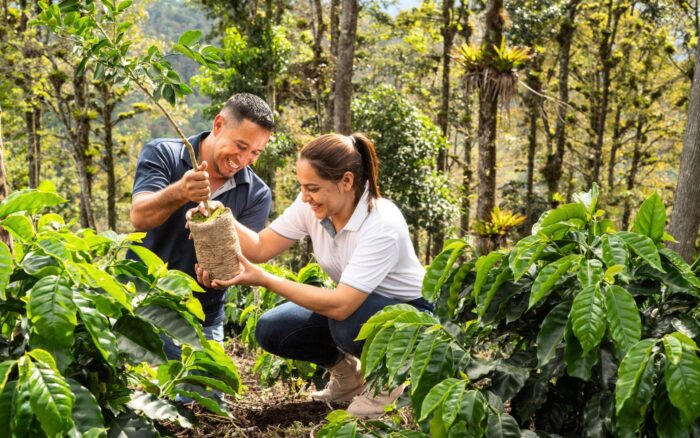Vienna – Qahwa World
In a landmark sustainability partnership, Julius Meinl, The J.M. Smucker Co., and Tchibo, in collaboration with the Hanns R. Neumann Stiftung (HRNS), have announced the launch of a four-year project to establish a Climate-Smart Coffee Region (CSCR) in Western Honduras. The initiative aims to strengthen smallholder livelihoods, restore ecosystems, and enhance climate resilience across key coffee-producing areas.
The 2025–2029 project will support 4,000 smallholder families, improve 6,000 hectares of farmland, and engage 20 farmer organizations in the departments of Ocotepeque, Copán, and Lempira. Implementation will be led by HRNS Honduras, with the initiative remaining open for additional partners interested in contributing to this collaborative model.
Transforming Coffee Landscapes
Building on 15 years of field expertise through the initiative for coffee&climate (c&c), of which all three companies are members, CSCR Honduras will deploy proven tools for climate adaptation. These include soil and water conservation, agroforestry systems, erosion control, microclimate monitoring, and household-level innovations such as fuel-efficient stoves and water-saving technologies. The project focuses on areas surrounding the Celaque, Erapuca, Las Minas, and Volcán Pacayita protected zones, turning them into biodiversity-friendly and climate-smart coffee landscapes.
According to Theresa Ruperti, HRNS Program Manager, “Western Honduras is ecologically rich but increasingly vulnerable to climate change. Irregular rainfall, droughts, and rising temperatures have reduced yields by up to 30%. The CSCR project links productivity, resilience, and conservation — positioning the region as a model for sustainable coffee in Central America.”
Carina Needham, Global Sustainability Director at Julius Meinl 1862 GmbH, added: “This marks the first landscape-level initiative under our Generations Programme. Its uniqueness lies in collaboration — working with fellow roasters and local partners to create lasting impact where coffee, communities, and nature can thrive together.”
Strengthening Local Governance
The initiative’s strength lies in its territorial governance model, coordinated through inter-municipal platforms such as Higuito and MAPANCE. These structures will bring together municipalities, civil society, and local actors to pursue shared climate objectives. The Honduran Coffee Institute (IHCAFE) will provide technical training, research, and monitoring support, while a regional Community of Practice (CoP) will facilitate learning among 25 local institutions.
As a fifth-generation family business, Julius Meinl reaffirms its long-standing sustainability commitment, focusing on three core pillars — Origin, Planet, and People — to ensure a positive impact across its value chain.
The post Julius Meinl and Partners Launch Climate-Smart Coffee Initiative in Western Honduras appeared first on Qahwa World.




